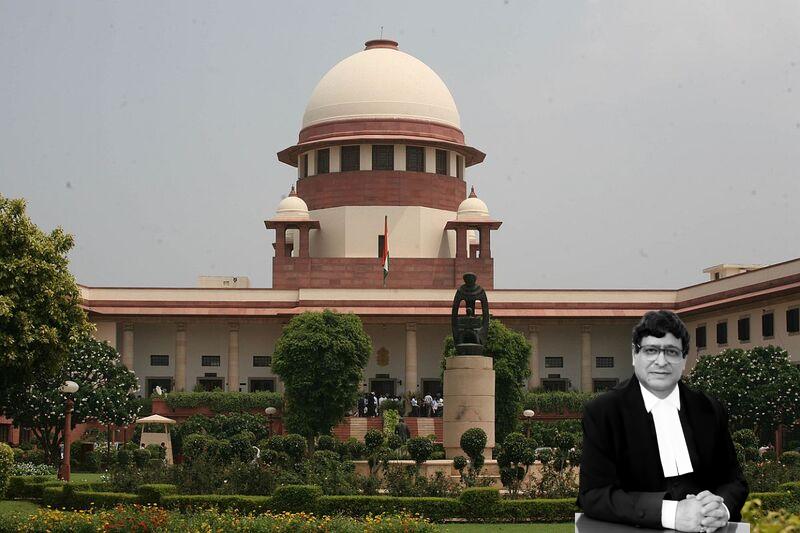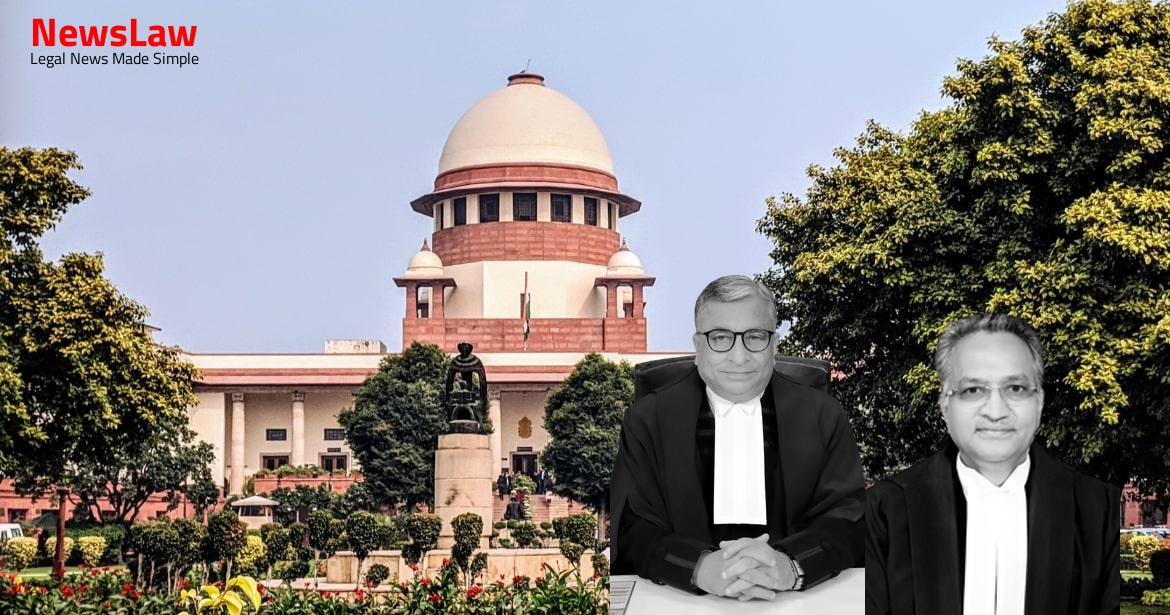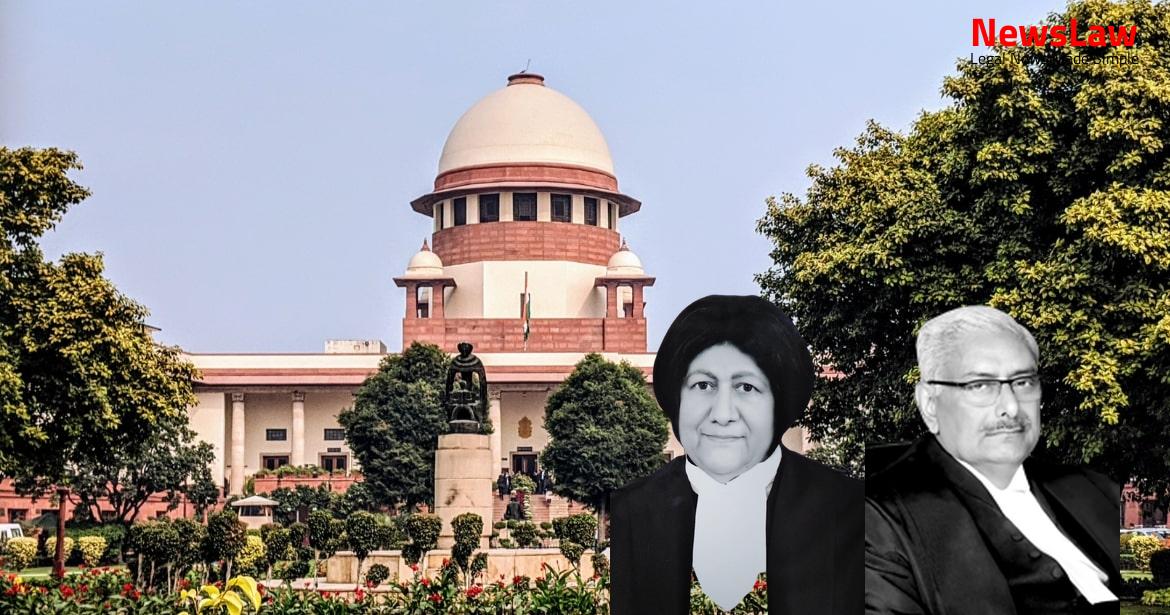These are the two appeals filed by the Union of India; Appeal No.1320/2010, is against the order dated 14.10.2008 passed by a Division Bench of the High Court of Judicature, Andhra Pradesh at Hyderabad in Writ Petition No.9541 of 2008 and Appeal No 1323/2010 is against the order dated 22.01.2009, of a Division Bench of the High Court of Judicature, Andhra Pradesh at Hyderabad passed in Writ 2 Petition No.494/2009. On 23.04.2003 he received a memorandum which said that he had given a false declaration that he had passed Class VI as the transfer certificate of Class VI submitted by him was found to be fake for which a disciplinary action was to be initiated against him under CCA Rules 1965. In response, the respondent denied the allegations and asserted that his certificate is genuine and further contended that the disciplinary proceedings, if any, would be governed by the Standing Orders and not under the CCA Rules 1965, and ultimately, he filed an OA before the CAT, Hyderabad, with a prayer to set aside the proceedings against him, inter alia, on the grounds that the disciplinary proceedings against him can only be initiated under the “Standing Orders”, and not under the CCA Rules.
On the date, an employee reaches the age of superannuation, he gets his pension only under the CCA Rules 1965, apart from a large number of other benefits and therefore it is not open for the employee to say that as long he enjoys the benefits, the Rules will be 5 applicable, but the same Rules will not be applicable in the disciplinary proceedings against him. Learned counsel appearing for the Department has drawn our attention to the appointment order dated 05.05.2001, which states that in matters of disciplinary proceedings the employee will be governed by the CCA Rules. Standing Orders made under the Industrial Establishment (Standing Orders) Act, 1946 are however Rules specific to workmen in an industrial establishment. Employees’ Union (1966) 2 SCR 498, Management, Shahdara (Delhi) 7 Saharanpur Light Railway Co. Parliament enacted the Industrial Employment (Standing Orders) Act, 1946 (“1946 Act” for short). Sub-section (2) of Section 13 imposes a penalty on employer who does any act in contravention of the standing orders finally certified under the Act.
But the experience of the working of this law over a long period has belied their faith.” The intendment underlying the Act and the provisions of the Act enacted to give effect to the intendment and the scheme of the Act leave no room for doubt that the Standing Orders certified under the 1946 Act become part of the statutory terms and conditions of service between the employer and his employee and they govern the relationship between the parties. Firestone Tyre & Rubber Co
[(1973) 1 SCC 813, 832 : 1973 SCC (L&S) 341, 360 : (1973) 3 SCR 9 587, 612 : (1973) 1 LLJ 278] Workmen v. So we are of the opinion that the inconsistent part of the special agreement is ineffective and unenforceable.” In Sudhir Chandra Sarkar (supra) it was ultimately held by this Court that the terms of a statutory contract of service was illegal because it denied gratuity to an employer which was against the Standing Orders that were legally binding on the employer.
However, before these standing orders are notified under Section 7, it may go through a quasi-judicial process, as any party aggrieved by any provisions of the standing orders has a right to appeal under Section 6 of the 1946 Act before the Appellate Authority. The 1946 Act mandates all owners of industrial establishments which are employing 100 or more workmen to prepare standing orders which should cover all matters relating to employment of a workman which have been given in the schedule of the 1946 Act and then these standing orders further need to be certified by the authority under the 1946 Act. The CCA Rules, 1965 are not specific to workmen as these are 13 general service rules applicable to all employees who work under the Central Government. (3) Notwithstanding anything contained in sub- rule (1), or the Indian Railway Establishment Code, these rules shall apply to every Government servant temporarily transferred to a Service or post coming within exception (a) or (e) in sub-rule (1), to whom, but for such transfer, these rules would apply.
Another important feature of the standing orders is that it is totally focused on the activities, nature of work of a workman and the treatment he deserves vis-a-vis the employer and the duties towards his employer. Recognising the rough deal that was being given to workers by employers who would not define their conditions of service and the inevitability of industrial strife in such a situation, the legislature intervened and enacted the Industrial Employment (Standing Orders) Act. The Bill accordingly seeks to 16 provide for the framing of ‘Standing Orders’ in all industrial establishments employing one hundred and more workers.” It was, therefore, considered, as stated in the preamble “expedient to require employers in industrial establishments to define with sufficient precision the conditions of employment under them and to make the said conditions known to workmen employed by them”. By a notification dated November 17, 1959 the Government of Uttar Pradesh has prescribed “Age of superannuation or retirement, rate of pension or any other facility which the employer may like to extend or may be agreed upon between the parties” as a matter requiring to be provided in the Standing Orders. Thereafter the Certifying Officer is required to give a hearing to the employer and the trade union or workmen as the case may be and to decide “whether or not any modification of or addition to the draft submitted by the employer is necessary to render the draft Standing Orders certifiable under the Act”. Vyas
[AIR 1960 SC 665 : (1960) 2 SCR 974 : 18 (1960) 1 LLJ 563 : 20 FJR 59], Rohtak Hissar District Electricity Supply Co. [AIR 1966 SC 1471 : (1966) 2 SCR 863 : (1966) 2 LLJ 330 : 29 FJR 76], and Western India Match Co.
We have no hesitation in saying that it is a special Act expressly and exclusively dealing with the schedule-enumerated conditions of service of workmen in industrial establishments.” (emphasis supplied)
Thus, it was held in Hari Shankar Jain (supra) that the Industrial Employment (Standing Orders) Act is a special act under which Standing Orders are laid down which deals with specific conditions of a workman in an “industrial establishment”, and the hard won right of a workman cannot be taken away by a general enactment such as CCA Rules, 1965. We are clearly of the view that the provisions of the Standing Orders Act must prevail over Section 79(c) of the Electricity Supply Act, in regard to matters to which the Standing Orders Act applies.” 15.
All the same, the High Court of Andhra Pradesh in its impugned order correctly makes a distinction here which is that whereas for the Madras Atomic Power Project (similarly constituted as NFC-Hyderabad) there is an exclusionary clause in terms of Section 13B of the 1946 Act in its Standing Orders but in the Standing Orders certified for NFC-Hyderabad, there is no mention of Section 13-B of the 1946 Act. Act not to apply to certain industrial establishments.—Nothing in this Act shall apply to an industrial establishment in so far as the workmen employed therein are persons to whom the Fundamental and Supplementary Rules, Civil Services (Classification, Control and Appeal) Rules, Civil Services (Temporary Services) Rules, Revised Leave Rules, Civil Service Regulations, Civilians in Defence Service (Classification, Control and Appeal) Rules or the Indian Railway Establishment Code or any other rules or regulations as may be notified in this behalf by the appropriate Government in the Official Gazette, apply.” Relying on the above provision, the argument of the employer is that the 1946 Act will not apply to an industrial establishment, if for the industrial establishment CCA Rules, 1965 have been made applicable, and since the CCA Rules, 1965 have been made applicable and it was specifically stated in the appointment orders of the respondents, the standing orders will have no application.
The Andhra Pradesh High Court, in the impugned judgment, though is of the opinion that there is some ambiguity in Section 13B of the 1946 Act as to whether a separate notification is required for only unspecified rules mentioned in Section 13B or will a separate notification also be necessary for the specified Rules such as CCA Rules, 1965. The notification read as under: “In pursuance of the provision of Section 13-B of the Industrial Employment (Standing Orders) Act, 1946 (Act No 20 of 1946), the Governor is pleased to notify in the official Gazette that the U.P. Nevertheless, since there is also an exclusion clause under Section 13B of the 1946 Act and there was indeed a notification under the said Act which we have already referred above, it will be the regulations made under the 1948 Act which will be applicable, but only so far as it relates to compulsory retirement, since the notification dated, 28 May, 1970 was only limited to compulsory retirement. … In our view the only reasonable construction that we can put upon the language of Section 13-B is that a rule or regulation, if notified by the Government, will exclude the applicability of the Act to the extent that the rule or regulation covers the field. We, therefore, hold that the Industrial Employment (Standing Orders) Act is a special law in regard to the matters enumerated in the schedule and the regulations made by the Electricity Board with respect to any of those matters are of no effect unless such regulations are either 26 notified by the Government under Section 13- B or certified by the Certifying Officer under Section 5 of the Industrial Employment (Standing Orders) Act.
In the present case the regulation made by the Board with regard to age of superannuation having been duly notified by the Government, the regulation shall have effect notwithstanding the fact that it is a matter which could be the subject- matter of Standing Orders under the Industrial Employment (Standing Orders) Act.” Relying upon the aforesaid decision, the Delhi High Court in Air India v. Moreover, the Standing Orders cover a wide area of activities of a workman and are workmen specific yet in view of Section 13B of 1946 Act a specific notification can be made applying CCA Rules, 1965 27 to that specific aspect. In the absence of such notification, we do not find any fault with the order of the Andhra Pradesh High Court which has held that it will be the standing orders and not the CCA Rules, 1965 which will be applicable.
Further, that any modification to the service conditions of the temporary workmen could only be done as per Section 10 of the 1946 Act. The Corporation undisputedly has not made any such modification to its Certified Standing 30 Orders by following the procedure for modification of conditions of service as per Section 10 of the Industrial Employment (Standing Orders) Act, 1946.” As we have already stated above NFC, Hyderabad has failed to place on record any modification made under Section 10 of the 1946 Act to show that the Standing Orders certified for NFC-Hyderabad would not be applicable to the respondent. This position has been reiterated by this Cout in Oil and Natural Gas Corporation Limited (supra) where conditions of appointment were held to be void and inapplicable to a worker if it makes any other Rule applicable in suppression of the ‘Standing Orders’ without 31 there being a modification under Section 10 of the Standing Orders.
No orders as to cost.
Case Title: UNION OF INDIA . Vs. K.SURI BABU
Case Number: C.A. No.-001320-001321 / 2010



